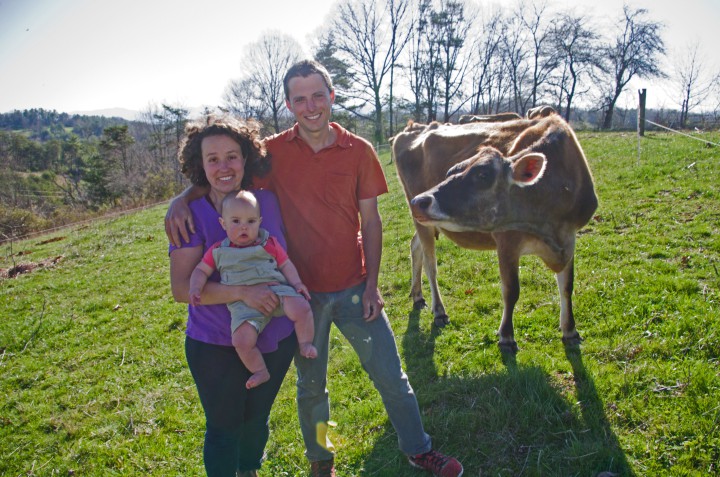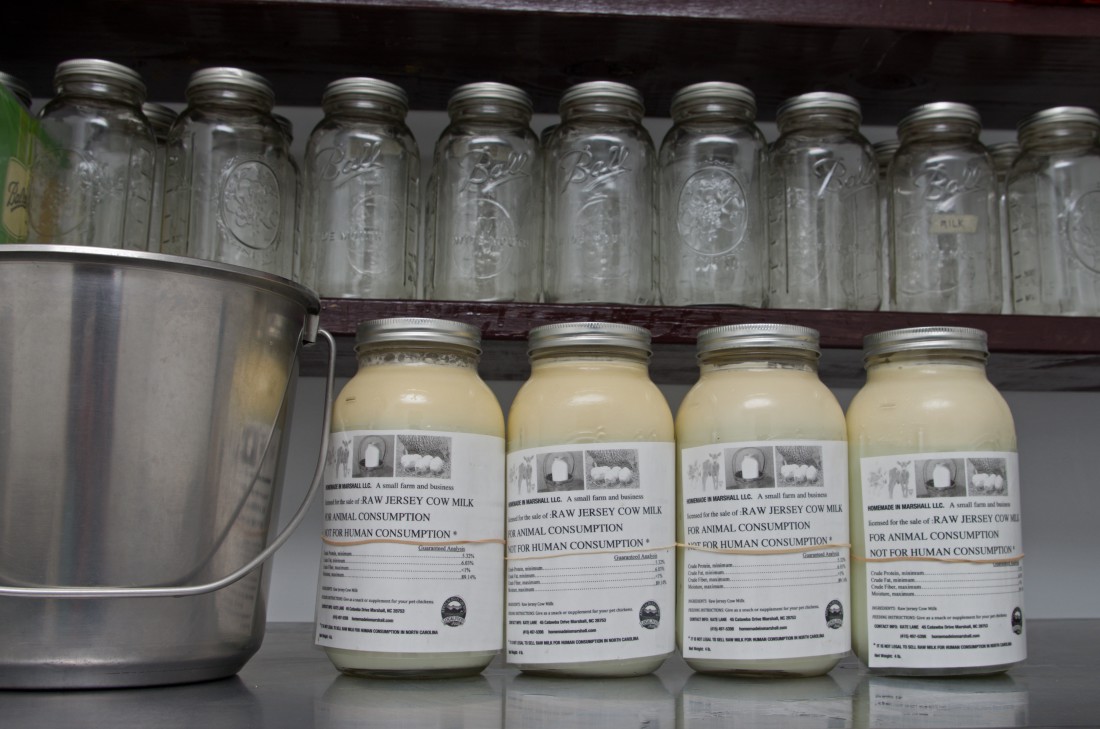Twice a month, “Emma Gordon” (not her real name) pays a truck driver to make a run across the South Carolina border. The Asheville mom isn’t dealing in homemade moonshine or smuggling drugs, yet the product she brings to local families — raw milk — can’t legally be sold for human consumption in North Carolina.
“It’s legal to buy in South Carolina,” Gordon explains, “so what we’re doing is … in kind of a legal gray area.”
Raw milk comes straight from the cow — it hasn’t been pasteurized (heated to high temperatures for specific lengths of time to kill potentially harmful pathogens). For the past three years, Gordon has managed a cooperative in Asheville that buys raw milk from two South Carolina farms and raw cheese, yogurt and butter from an organic Amish farm in Pennsylvania.
Every two weeks, members put in their orders, and the truck heads south. The products are delivered to two drop sites, one in West Asheville and one in Montford, where members collect their milk and pay $9 (for grain-fed) or $14 (for organic grass-fed) per gallon.
The cooperative, says Gordon, now has several hundred members and averages about 70 gallons of milk per run. “And we’re not the only people doing it,” she continues. “More and more people are getting comfortable with selling raw milk.”
Yet both the U.S. Food and Drug Administration and the Centers for Disease Control and Prevention warn against unpasteurized dairy products in no uncertain terms. “Raw milk can harbor dangerous microorganisms that can pose serious health risks,” notes the FDA website. And the CDC categorically states: “There are no known health benefits from drinking raw milk that cannot be obtained from drinking pasteurized milk that is free of disease-causing bacteria.”
Sue Ellen Morrison, disease control lead nurse at the Buncombe County Health Department, agrees. “While it’s possible to get foodborne illnesses from many different foods, raw milk is one of the riskiest of all,” she says. “Getting sick from raw milk can result in diarrhea, stomach cramping and vomiting. Less commonly, it can mean kidney failure, paralysis, chronic disorders and even death.”
According to data from the CDC, from 2007 to 2012 no illnesses related to consumption of raw milk were reported in North Carolina, although five were documented in South Carolina during that time period.
A growing local trend
Gordon knows of several other such cooperatives in the Asheville area, and a number of local farmers sell unpasteurized milk at local tailgate markets or straight from their farms, sometimes labeled as pet food (a loophole in the law allows raw milk to be sold for that purpose). Mostly it’s not advertised, so finding it is “a matter of knowing the right person,” she notes.
Kate and Kevin Lane are more upfront about their business. From their 15-acre farm, Homemade in Marshall, the Lanes sell the milk from their herd of seven Jersey cows in half-gallon Ball jars. By May, when three of their cows are due to give birth, Kate estimates that they’ll be delivering about 100 gallons of raw milk per week to customers.

Each jar has a label that Kate painstakingly created to meet detailed guidelines from the state Department of Agriculture & Consumer Services. The words “for animal consumption, not for human consumption” are emblazoned at the top, followed by a disclaimer that it’s illegal to sell raw milk for human consumption in North Carolina. The farm, she notes, spends several hundred dollars per year on testing and fees to stay in the state’s good graces.
Although some of her customers do feed the milk to their pets, many are drinking it themselves. “We’ve been selling milk to people for seven years, so we have personal relationships with our customers: We know what they do with it,” says Lane, adding that she’s comfortable with that. “We’re really focused on our cows’ well-being and health. All of our cows have a name, and they come when they’re called. We check their physical condition every day, so we’re acutely aware of when they’re coming down with something.” Lane also milks all her cows by hand and hand-filters the milk.
Those arguments don’t appear to sway the CDC, however, which points out on its website, “Even dairy farms with very good safety practices can harbor illness-causing germs. And even if a batch of a farm’s raw milk tests come back negative, it is no guarantee that the next batch will be free of harmful germs.”
In light of those health warnings, why are people seeking out raw milk when the pasteurized variety is more easily obtained — and legal?
More nutritious?
Alternative health educator Andi Locke Mears buys about a half-gallon of raw milk each week from an unidentified Asheville farm to make kefir, a fermented milk product, for herself and her husband. For Mears, it’s all about the health benefits. “It’s just superior in nutrition,” she maintains.
“Pasteurized milk is milk that’s dead: It’s a processed product. It’s awesome when you get the real foods because they have so much flavor, their fats are so healthy and the nutrients are there. They haven’t been adulterated by high heat or anything, so it’s a whole different food.”
The FDA’s website, however, states that “pasteurization does not reduce milk’s nutritional value.”
Mears, though, says some people opt for raw milk because their bodies can’t process the pasteurized kind. “I’ve seen absolute miracles happen when people start drinking raw milk vs. adulterated milk,” she says. “It’s meant for our bodies. … A lot of people have lactose issues [with pasteurized milk].”
Gordon, too, says many of her cooperative’s members buy raw milk to address symptoms of various health issues, including autoimmune problems, digestive disorders, allergies, asthma and irritable bowel syndrome. “There are an awful lot of people who come to us and are like, ‘Thank God I found you!’” she reports.
Yet the FDA maintains that “pasteurizing milk does not cause lactose intolerance and allergic reactions. Both raw milk and pasteurized milk can cause allergic reactions in people sensitive to milk proteins.” And the CDC dismisses as a myth the idea that “drinking raw milk can prevent or cure diseases, such as asthma, allergies, heart disease or cancer.”
Morrison, meanwhile, stresses the risks, saying, “Many people who choose raw milk to improve their health can instead find themselves (or their loved ones) in a hospital for several weeks fighting off infections.”
However, Amy Lanou, associate professor of the Health and Wellness Department at UNC Asheville, says that while she acknowledges there are some risks in drinking raw milk, it may, in fact, have some health benefits. Although Lanou generally recommends diets that don’t contain cow’s milk at all, she says the heat used in the pasteurization process would kill any beneficial bacteria present in milk as well as altering the nature of its proteins.
She also says claims that raw milk helps people with immune issues, allergies and asthma could hold water as any “immune stimulating agents present in raw milk would be destroyed by pasteurization. People who are consuming raw milk are getting more natural exposure to allergens at levels that are naturally present in the foods they consume.”
Some raw-milk proponents would agree. Lane and her husband, not content with feeding their cows grass exclusively, recently planted 125 locust, mulberry and persimmon trees in their pastures, augmenting that grain-free diet with a variety of leaves, shoots and fruit. “The grass-fed milk you buy at the store, those cows might only be eating hay, and we feel that cows should have a more diverse diet. Our cows are healthier than cows that just eat hay,” she says.
Mears, too, says health fears are unfounded as long as the raw milk comes from sanitary, trustworthy farms. “If you look at the statistics from our government, most of the issues come with pasteurized food and pasteurized milk,” she says, citing data from realmilk.com and research by nutritionist Chris Kresser. “Raw milk has redundancies built into it to destroy pathogens. Pasteurized milk doesn’t do that.”
Meanwhile, North Carolina may be changing its law. On March 23, the Got Natural Milk bill (HB 309) was filed in the state House. The bill would allow consumers to buy “shares” of a farmer’s cow or herd and the milk produced. Lane says the proposed change wouldn’t affect her business as long as she could continue selling her milk as pet food, but Mears maintains that legalization would enable many small dairy farmers who trade in raw milk to “come out of the closet.”
Furthermore, she asserts, “Changing the law is key. That way we can get better information, better education out to people. And we can address these fears that are totally unfounded.”
For more on raw milk, see “The Raw Milk Debate: An Interview With Food Activist David Gumpert.”




Her
Best milk I’ve ever had! Helps me use the bathroom, unusual for milk. It’s loaded full of probiotics and other nutrients. The cows are also completely content and appreciated as individuals! It’s amazing but k and k truly love and are connected to their cows!!!!
Salmonella helps me use the toilet, too. But it isn’t healthy.
“Your fear make air stink!!”
(Quote from Karate Kid II). :O)
HB309: Bipartisan legislation sponsored by Representative McGrady would allow the personal consumption and limited sale of unpasteurized milk (and milk products) for people who own (or partially own) a lactating animal, such as a cow, goat, or sheep.
http://nchouse117.com/got-natural-milk/
.
Funny, I can buy a gun from my neighbor, but I can’t buy raw milk from him.
You can’t drink a gun, but you can’t shoot a person with milk either!! Unless it’s in a milk-gun shooter thing, I guess. LOL!! :OD
Love raw milk, thank you for all you do Kate and Kevin! An educated consumer can make their own decisions about who they buy their milk from and how they want to consume it. If people want their milk pasteurized and homogenized then great. The rest of us want the option to buy it unmolested :)